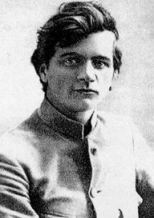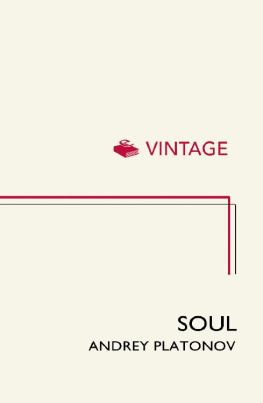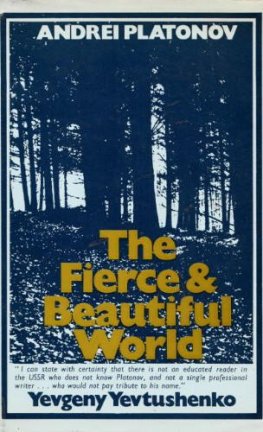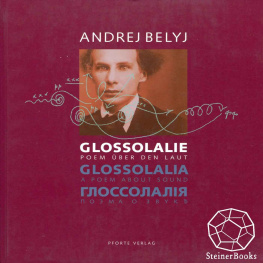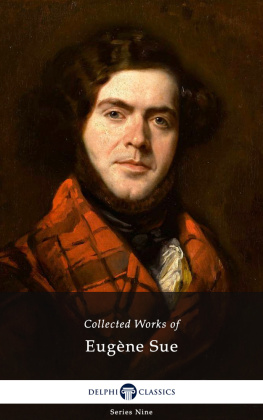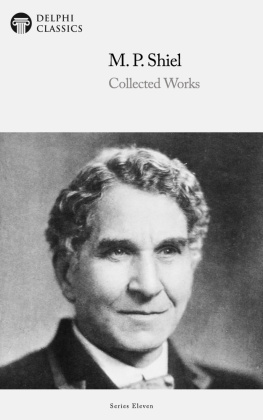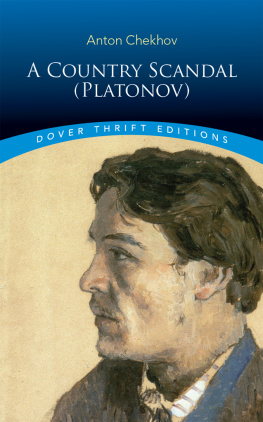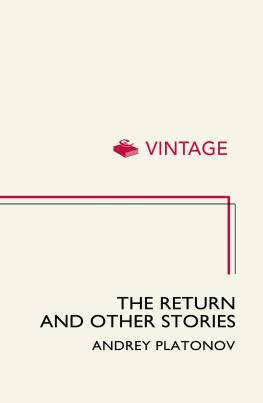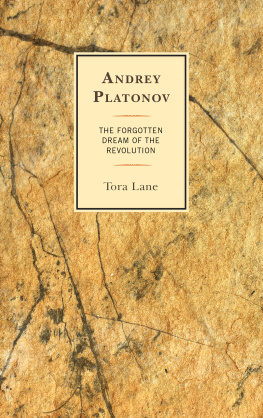Andrei Platonov - Collected Works
Here you can read online Andrei Platonov - Collected Works full text of the book (entire story) in english for free. Download pdf and epub, get meaning, cover and reviews about this ebook. year: 1978, publisher: Ardis, genre: Detective and thriller. Description of the work, (preface) as well as reviews are available. Best literature library LitArk.com created for fans of good reading and offers a wide selection of genres:
Romance novel
Science fiction
Adventure
Detective
Science
History
Home and family
Prose
Art
Politics
Computer
Non-fiction
Religion
Business
Children
Humor
Choose a favorite category and find really read worthwhile books. Enjoy immersion in the world of imagination, feel the emotions of the characters or learn something new for yourself, make an fascinating discovery.
- Book:Collected Works
- Author:
- Publisher:Ardis
- Genre:
- Year:1978
- Rating:3 / 5
- Favourites:Add to favourites
- Your mark:
- 60
- 1
- 2
- 3
- 4
- 5
Collected Works: summary, description and annotation
We offer to read an annotation, description, summary or preface (depends on what the author of the book "Collected Works" wrote himself). If you haven't found the necessary information about the book — write in the comments, we will try to find it.
Collected Works — read online for free the complete book (whole text) full work
Below is the text of the book, divided by pages. System saving the place of the last page read, allows you to conveniently read the book "Collected Works" online for free, without having to search again every time where you left off. Put a bookmark, and you can go to the page where you finished reading at any time.
Font size:
Interval:
Bookmark:
Andrei Platonov
COLLECTED WORKS
Preface by Joseph Brodsky
Translations by Thomas P. Whitney,
Carl R. Proffer, Alexey A. Kiselev,
Marion Jordan, Friederike Snyder
English translations copyright 1978 by Ardis
ISBN 0-88233-134-5
COLLECTED WORKS
CONTENTS
Preface to The Foundation Pit (Joseph Brodsky) ix
THE FOUNDATION PIT (Thomas P. Whitney) 1
THE BARREL ORGAN. A Play in Three Acts (Cari R. Proffer) 159
The Epifan Locks (Marion Jordan) 223
The Potudan River (Alexey A. Kiselev) 257
Homecoming (Alexey A. Kiselev) 286
Light of Life (Alexey A. Kiselev) 311
The Cow (Alexey A. Kiselev) 326
The Takyr (Marion Jordan) 338
The Third Son (Alexey A. Kiselev) 359
Fro (Alexey A. Kiselev) 365
The City of Gradov (Friederike Snyder) 388
Makar the Doubtful (Alexey A. Kiselev) 420
the
foundation
pit
On the day of the thirtieth anniversary of his personal life Voshchev was given his walking papers by the small machine shop where he had been getting the means for his existence. In the document of dismissal they informed him he was being detached from production as a consequence of a growth in the strength of his weakness and of pensiveness in the midst of the general tempo of labor.
Voshchev took his things in a sack from his apartment and went out into the open air, the better to comprehend his future. But the air was empty, the unmoving trees thriftily preserved the heat within their leaves, and the dust lay there bored on the unpopulated roadway-such was the situation in nature. Voshchev did not know whither he was being drawn, and at the end of the city he supported himself with his elbows on a low fence of a certain residence in which children without families were being taught to work and be useful. Beyond this point the city ceasedand the only thing there was a beer parlor for migratory workers and low-paid categories which stood, like some official institution, without any courtyard; and beyond the beer parlor rose a clay knoll and an old tree grew on it all alone in the midst of the bright weather. Voshchev made his way to the beer parlor and encountered there sincere human voices. Here were to be found unconstrained people devoting themselves to the oblivion of their own unhappiness, and for Voshchev it was more sad and more easy among them. He was present in the beer parlor until evening fell, till the wind of the changing weather began to rustle; at that point Voshchev went over to the open window so as to observe the beginning of the night, and he saw the tree on the clayey hill-rocking back and forth from the bad weather and turning its leaves over and over out of clandestine shame. Somewhere, evidently in the park of the Soviet trade employees, a brass band languished. The monotonous, nagging music was being wafted off by the wind into nature across the waste land this side of the ravine, because the
wind was supposed to feel gladness only rarely, but could accomplish nothing itself equal in meaning to music and spent its time in the evenings motionless. After the wind silence once more settled in, and a still more silent darkness covered it over. Voshchev sat there at the window so as to observe the tender darkness of the night, to listen to various sad sounds, and to be in a state of torment within his heart which was surrounded by hard and stony bones.
"Hey, you food industry fellow!" resounded in the by now silent establishment. "Give us a pair of mugs-something to fill up our empty insides with!"
Voshchev had long since noted that people always came into the beer parlor in pairs, like brides and grooms, and sometimes in whole marriage companies.
The food industry employee served up no beer this time, and the two newly-arrived roofers wiped off their thirsting mouths with their aprons.
"You bureaucrat! You ought to jump whenever a working man even raises his fingerbut instead you act conceited!"
But the food industry employee saved his strength from being worn down at official duties so as to keep it for his personal life and did not enter into disagreements.
"This institution, citizens, is closed. Go find something to do in your own apartment."
The roofers each took from the saucer a salty cracker into their mouths and went their way. Voshchev was left alone in the beer parlor.
"Citizen! You ordered only one mug and you keep sitting here indefinitely! You paid for the beer not for housing!"
Voshchev picked up his bag and went off into the night. Up above Voshchev the questioning heavens shone with the poignant strength of the stars, but in the city the lights had already been extinguished: whoever had the possibility to do so was sleeping after having eaten dinner. Voshchev descended the crumbly earth into the
ravine and there lay down with his stomach to the ground so as to go to sleep and bid farewell to self. But for sleep it was necessary to possess peace of mind, confidence in life, and forgiveness of experienced grief, and Voshchev lay there in the dry tension of consciousness and did not know whether he was useful in the world or whether everything could do quite well without him. The wind began to blow from an unknown place so that people would not suffocate, and a dog on the outskirts of the city gave notice of his service with a weak and doubtful voice.
"It's boring for the dog. He lives only because he was born, just like me!"
Voshchev's body grew pale from fatigue; he felt cold on his eyelids and closed them over his warm eyes.
In the morning the barman had already freshened up his establishment, the wind and the grass had already been aroused all around by the sun, when Voshchev regretfully opened his eyes into which moist strength poured. Once again he had ahead of him the prospect of living and getting nourishment, and therefore he went to the trade union headquartersin order to defend his unnecessary labor.
"The administration says that you kept standing there thinking in the midst of work," they told him in the trade union office. "What were you thinking about, Comrade Voshchev?"
"About a plan for life."
"The factory works on the basis of the assigned plan from the trust. And you should have worked out your plan for your personal life in the club or in the Red Reading Room."
"I was thinking about the plan of life as a whole. I don't worry about my own life. It is not a riddle to me."
"Well, and what could you do indeed?"
"I could think up something like happiness, and as a result of emotional meaning labor productivity would improve."
"Happiness results from materialism. Comrade Voshchev, and not from meaning. We are unable to defend you. You are an irresponsible person and we have no desire to turn up at the tail end of the masses."
Voshchev wished to ask for some kind or other of the weakest work just so he would get enough for his nourishment: he would think in non-working hours. But to make a request it is necessary to have respect for people, and Voshchev did not see any sympathy from them for him.
"You are afraid to be on the tail end: it is an extremity, and so you are riding on peoples' necks."
"To you, Voshchev, the state has given an extra hour for your pensiveness. You used to work eight and now you work seven. You would have done better to go on living and keep your mouth shut! If all of us all at once were to start to ponder, who would act?"
"Without thinking people act meaninglessly!" Voshchev declared thoughtfully.
He left the trade union office without getting help. His way afoot lay in the middle of the summer; off to the sides they were building apartment buildings and technical public facilitiesin those apartment houses the masses who till now had been without shelter would exist in silence. Voshchev's body was indifferent to comfort; he could live, in the open air without getting exhausted, and he languished in unhappiness when he was well fed on rest days at his former apartment. Once more he had to pass by the beer parlor on the city's outskirts, and once more he looked at the place where he had spent the night; something was left there in common with his life, and Voshchev found himself out in space, where before him lay only the horizon and the sensation of the wind in his face which was bent forward.
Next pageFont size:
Interval:
Bookmark:
Similar books «Collected Works»
Look at similar books to Collected Works. We have selected literature similar in name and meaning in the hope of providing readers with more options to find new, interesting, not yet read works.
Discussion, reviews of the book Collected Works and just readers' own opinions. Leave your comments, write what you think about the work, its meaning or the main characters. Specify what exactly you liked and what you didn't like, and why you think so.

